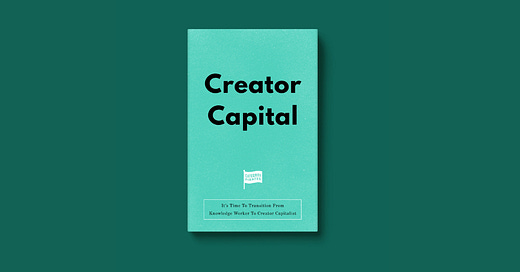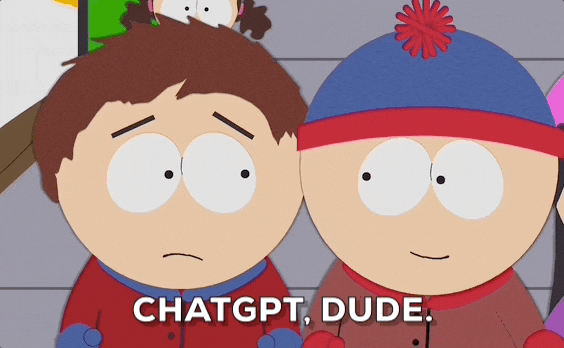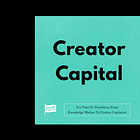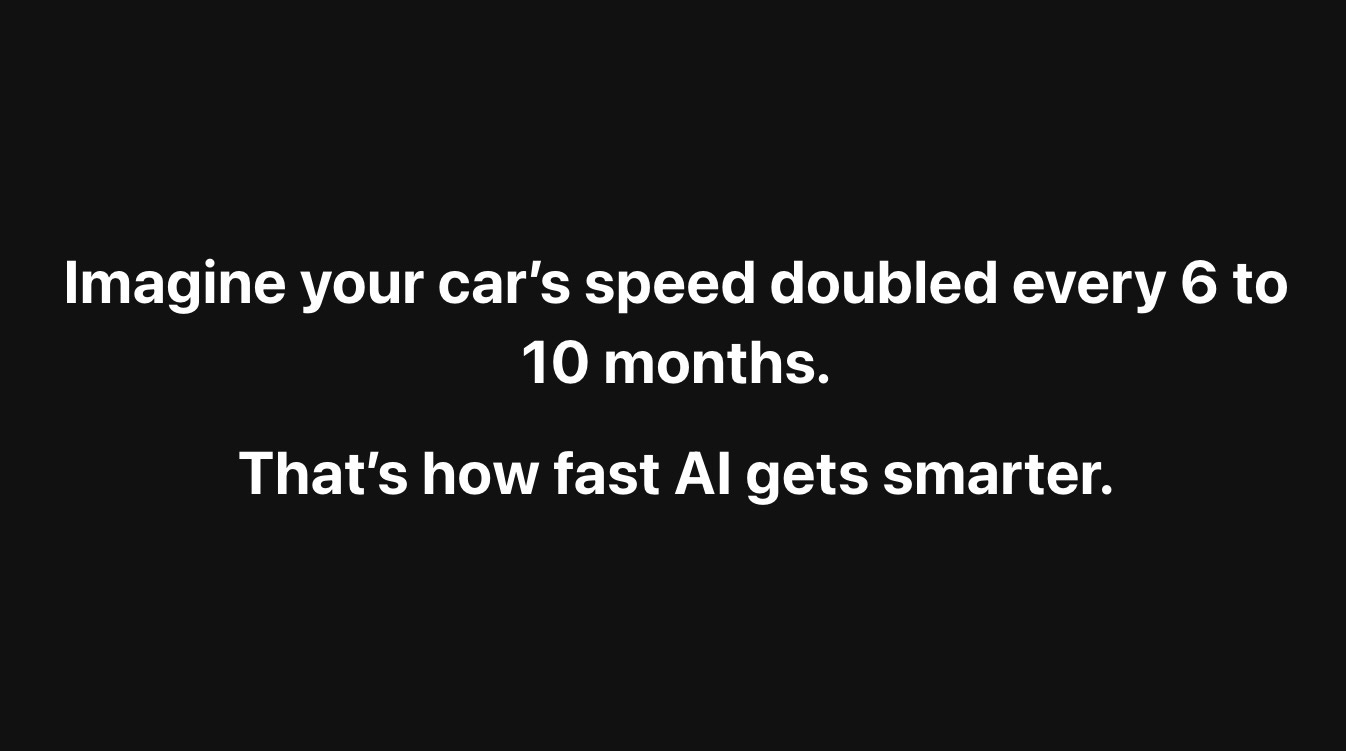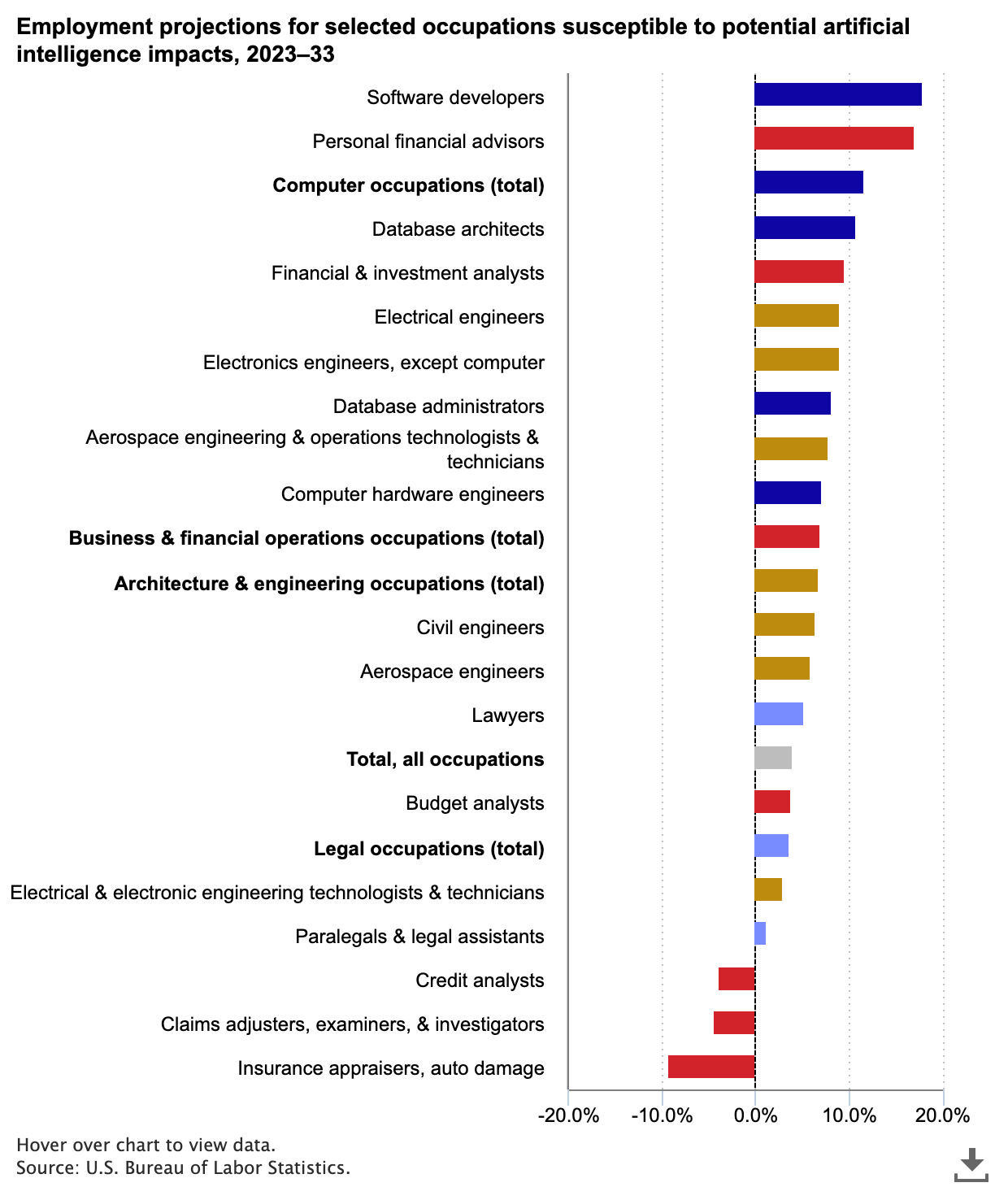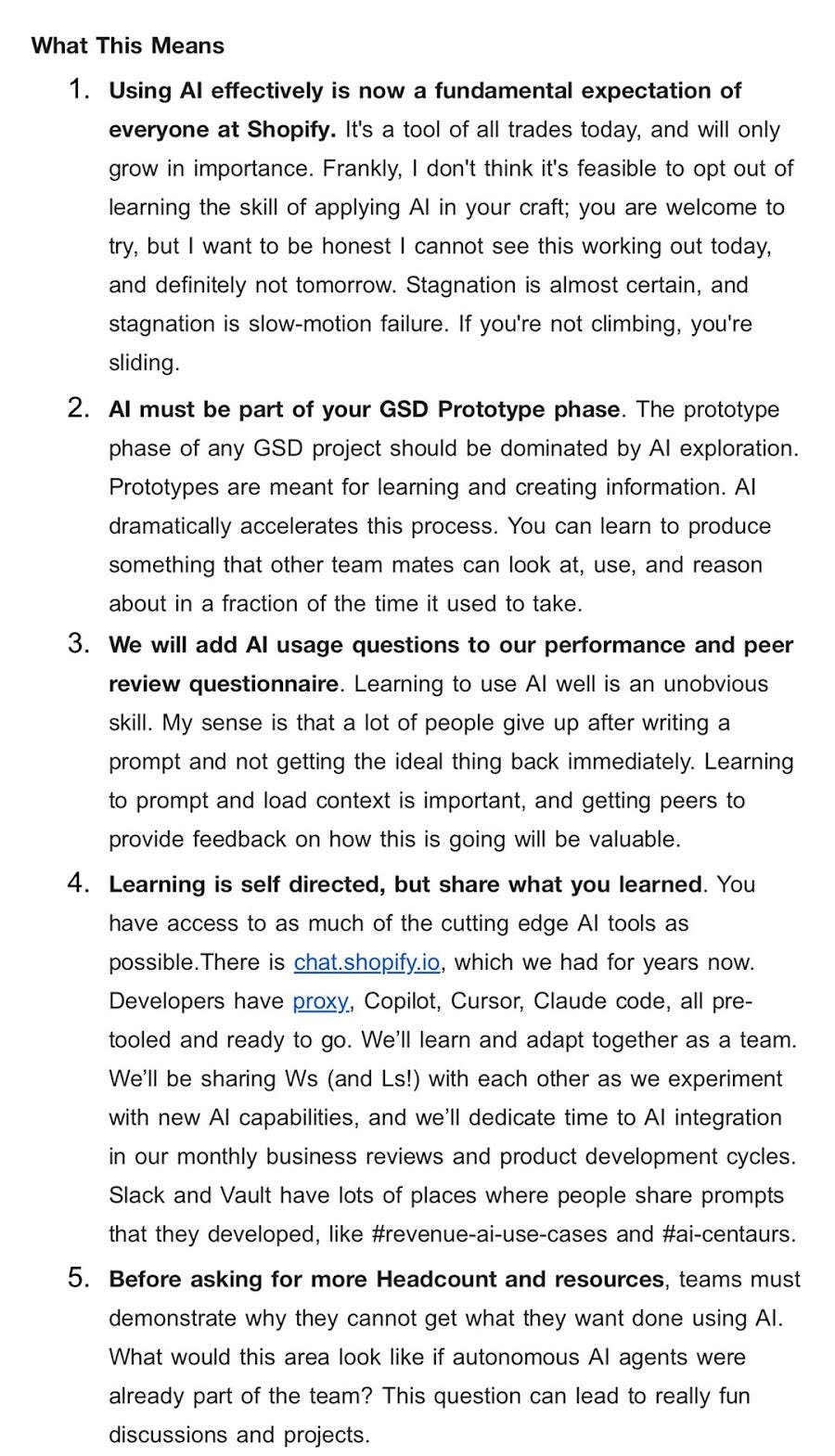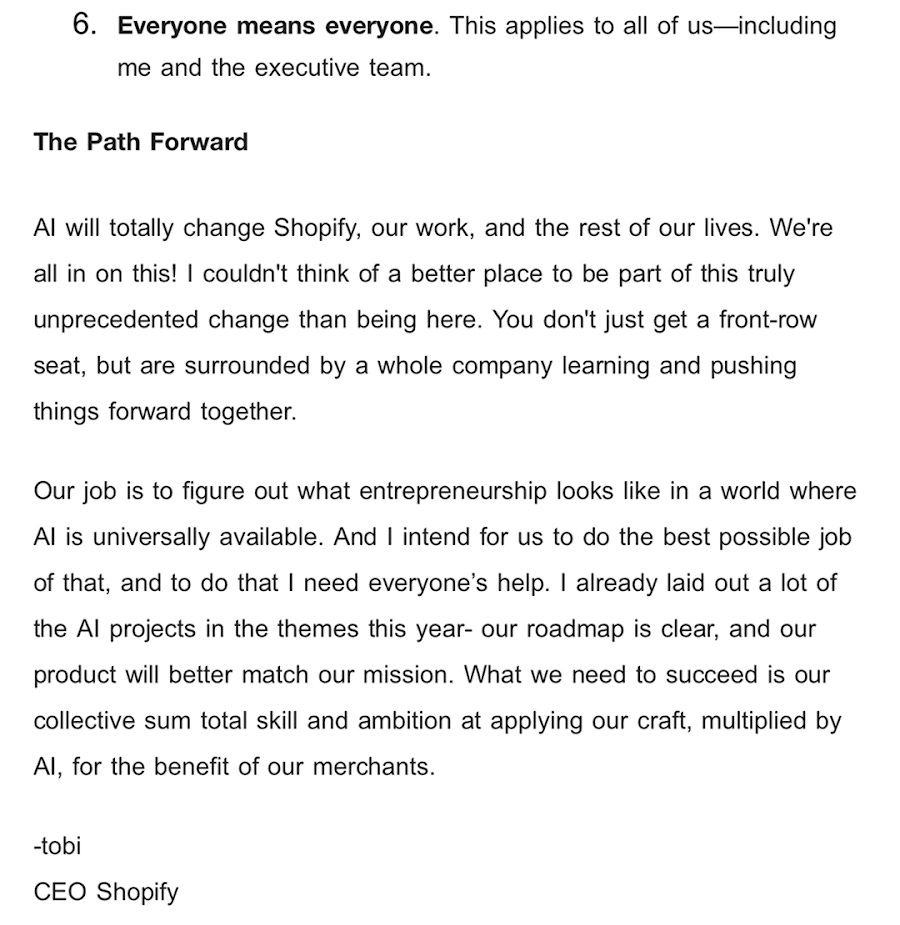Creator Capital: It’s Time To Transition From Knowledge Worker To Creator Capitalist
Category shifts bring the greatest opportunities—and AI is the biggest work shift in history.
Arrr! A quick announcement: In May, we’re launching Creator Capitalist — the step-by-step system to discover your superpower, design your dream career, and get paid to be you. It’ll show you how to unlock your unique Point of View, build your Creator Capital, and design Good, Better, and Best offers to attract Superconsumers. If you want practical steps and exercises that go beyond the mini-books, this is it.
Dear Friend, Subscriber, and Category Pirate,
You’re living through one of the most exciting moments in human history.
Right now, you have the opportunity to design the career of your dreams. To create a life of radical abundance and unparalleled freedom. To do work that genuinely matters, taps into your greatest strengths, and allows you to create exponential value in the world.
This isn’t a hustle porn cliché.
It’s a radical idea—you can create your career.
(Just like you would custom design your unique version of a coffee drink at Starbucks.)
And not just any career, but one that is a dream come true for you.
Now, if you're skeptical, we understand. We didn’t always believe it either. But we assume you’re reading because you’re interested in what it could look like to create a legendary career and get paid to create net new value.
The reason you can do this now (more than at any other time in history) is because we’re living through the most significant category shift in the modern era: the rise of AI and the ascent of a new category of human—the Native Digital.
It’s happening now, and you’re perfectly positioned to surf this wave.
Here's why:
Category shifts bring the greatest opportunities—and artificial intelligence is the biggest work shift in history.
Think about the shift from farming to industrialization. Or analog to digital. Or about the internet in the 1990s—when legendary venture capitalist John Doerr said it was “under-hyped,” even though most considered it wildly overblown.
We feel the same way about AI today.
Despite all the buzz, AI is still radically under-hyped.
Because what’s actually happening isn’t just technological. It’s a full-blown category shift. And it’s reshaping how we work, what we value, and how careers are designed from the ground up.
We’re shifting from an era dominated by Native Analog Knowledge Workers (who apply existing knowledge)…
To an era led by Native Digital Creator Capitalists (who use AI to create net-new value no one else can replicate).
This change is happening faster than most people realize.
Think about it: For 300,000 years, humans have been analog-first. But Millennials and Gen Z—the first Native Digitals—flipped that script. They’re digital-first, analog-second. To them, a FaceTime call isn’t “virtual,” it’s face-to-face. A text isn’t casual, it’s primary communication. Their digital lives are the real ones.
Now, we’re entering the next wave: Generation AI.
Born after 2010, Gen Alpha will be the first humans to grow up with AI not as a tool, but as a native layer of daily life. It won’t be an add-on. It’ll be infrastructure.
This isn’t a small cultural blip.
It’s part of the most significant shift in how value is created since we stopped hunting and gathering. That’s what makes this moment so exciting. And while the world scrambles to catch up, you can get ahead.
To stop competing with AI—and start creating with it.
To stop applying old ideas—and start building new ones.
As author Richard Bach says, “What the caterpillar calls the end of the world, the master calls a butterfly.”
Here’s the good news:
If you’ve ever taken an idea and turned it into something of value for others (a social post, a product, a framework, a business plan, a podcast, a course, a company), you’re already a Creator Capitalist.
Let’s dive into what that actually means for your career.
🔊 Want to listen to this mini-book instead? Head to the audiobook.
Creator Capital: The New Value Stack To Transition From Knowledge Worker To Creator Capitalist
In 1959, Peter Drucker saw a legendary shift coming—the world was moving from muscle to mind. From factory floors to office towers. From blue collar to white collar. So Drucker created a new category: "Knowledge Workers,” people who work primarily with information and ideas rather than physical things.
For over 70 years, he was right.
Knowledge Workers became the most valuable people in every organization.
Companies obsessed over "knowledge worker productivity." Parents pushed their kids toward Knowledge Work careers (doctors, lawyers, professors, accountants, bankers, scientists, etc). The game was simple:
Get educated (acquire valuable knowledge)
Get hired (apply that knowledge)
Get paid (trade knowledge for money)
Get promoted (apply more knowledge)
Retire (stop trading knowledge)
This model created the most prosperous professional class in human history.
Until now.
The Internet democratized access to knowledge. AI made knowledge instantly available to anyone. Suddenly, knowing things isn't enough anymore. (Anybody can know anything they want, any time they want.)
When ChatGPT can instantly explain complex legal precedents, or AI can analyze market data faster than any human, or write high-quality software, or algorithms that diagnose diseases more accurately than doctors…
What's the value of just being knowledgeable?
AI changes the value of existing knowledge (and that’s great news).
Back in the day, knowledge was power. People repeated “knowledge is power” like a mantra. Existing knowledge had value because few humans could memorize and regurgitate knowledge on demand.
The more valuable knowledge you had, the more valuable you were.
These folks were called experts, professors, and professionals.
That’s why students were taught to memorize knowledge. Tests were created to discern how much (existing) knowledge students could accurately regurgitate. Knowledge Regurgitation was how you passed or not. Knowledge Regurgitation determined if you moved on to the next grade. Knowledge Regurgitation test scores determined where you could go to college. Knowledge Regurgitation was the driver of whether you got hired, promoted, and paid.
Knowledge cramming and regurgitation was the game.
That’s over.
AI destroys the value of existing knowledge.
Today, knowledge is cheaper than sand. Because AI doesn't just compete with Knowledge Workers—it demolishes them. Consider this:
Goldman Sachs CEO David Solomon says AI can draft 95% of an IPO prospectus (an S-1) in minutes—a task that used to require days of high-powered bankers, lawyers, and consultants. (We’ve written a few S1s in our day. It used to be a long, very expensive, slow grind. Not now.)
Goldman Sachs research predicts AI will impact 300 million jobs globally. (Yes, you read that right—300 million jobs.)
Some experts project that 90% of internet content will be AI-generated by 2026. (Read that again—90%.)
The writing isn't just on the wall. It's flashing neon on a billboard the size of Texas.
Want corporate law explained in five seconds flat? ChatGPT can do that. Need market insights faster than Goldman Sachs can draft a single S-1 slide? Perplexity and Grok have it covered.
We used to live under Moore’s Law—the idea that computing power doubled every two years.
But that timeline just got nuked.
Nvidia CEO Jensen Huang calls it Hyper Moore’s Law—AI isn’t doubling in power every two years. It’s doubling every 6 to 10 months. That means what was “state-of-the-art” in spring could be laughably outdated by Christmas.
And it’s not just speed.
It’s scale.
AI is now learning faster and creating more impact than most humans can comprehend. This is no longer about keeping up. It’s about catching a wave that’s already halfway to shore. (And AI is not just a wave. It’s a massive swell of compounding waves of increasing power.)
But this is legendary news.
While AI decreases the value of existing knowledge, it massively increases the value of creators—those who can leverage AI to generate net-new ideas, solutions, and content.
According to recent projections from the Bureau of Labor Statistics, jobs susceptible to AI (including software developers, financial advisors, and engineers) will grow, ranging from 6% to nearly 18% through 2033.
Here’s the a-ha: While AI can replicate routine tasks, it significantly amplifies the value and demand for careers built around creativity, strategic thinking, and human innovation.
In other words:
If your career depends solely on applying existing knowledge, you compete directly against AI.
But if you use AI as a tool to create new thinking, new categories, and new possibilities, your value skyrockets exponentially.
If you think we’ve gone crazy, consider this leaked memo from Tobias Lutke, the CEO of Shopify, around AI:
Said differently: Imagine your company was just acquired by a Chinese company. One of the first memos said, “All business communication and meetings will now be conducted in Mandarin. Your ability to get promoted, your bonus, stock options, and the longevity of your career will be determined by your fluency in Mandarin.”
You’d get on Duolingo pretty quickly, no?
AI is the new language of business—you best start getting your flashcards ready. Because we’re witnessing something humanity has never seen before. Too many legacy Knowledge Workers are struggling.
(This will get worse.)
Those in trouble today are knowledge appliers—people who can do things easily replaced by AI.
This means the value stack has fundamentally shifted.
Forever.
FROM Knowledge Workers who:
Learn existing information
Apply knowledge for others in a company
Own their title and paycheck
Trade time for money
Balance work/life
Stay in their lane
Compete on memorization/regurgitation
Enjoy retirement and not working
TO Creator Capitalists who:
Create new knowledge
Build scalable solutions for themselves
Own their own intellectual property
Trade outcomes for money
Have radical agency over their time
Design their category
Lead through different
Love work and never want to retire
We predict AI will create more new value in the next 5 years than the past 20 combined.
But we’re worried many won’t recognize the profundity of this shift until it’s too late.
That’s why we’re on this mission: To propel you to become a Creator Capitalist who thrives in a post-AI world. Now, we're not here to teach you how to code, prompt-engineer, or build your ChatGPT clone. Plenty of legendary people already have that covered. Instead, our goal is to hand you a new lens to help you become someone who creates new value using AI, not someone replaced by it.
Because this isn't just another career trend.
It's as big a shift as Drucker saw in 1959—from manual labor to knowledge work. Now we're moving from knowledge work to Creator Capitalism. From applying information to creating innovation. From trading time to building assets.
And we know (some of) you might be thinking: “Wait… ‘capitalist’?”
So, let’s address the zebra in the room:
Why Creator Capitalism?
The word capitalist is loaded, especially among younger generations.
To many, it represents everything wrong with the system: inequality, exploitation, corporate greed. And the numbers back it up. A 2022 Pew study found that only 40% of Americans aged 18–29 view capitalism positively—the lowest approval rating of any age group. Given the realities of stagnant wages, widening wealth gaps, and repeated economic crises, it's understandable why many blame the system.
BUT. Consider the irony of an influencer criticizing capitalism…
While recording a video from a comfortable home
Using internet-connected smartphones, laptops, and earbuds
Sharing their content globally via platforms built on capitalist innovation
Wearing quality clothes and benefiting from countless capitalist-driven comforts
But that's exactly why we chose this language.
Because this is a reframe. A reclamation.
Capitalism’s greatest strength is its unparalleled ability to incentivize innovation and category creation.
Capitalism fuels innovation.
In 2024, European Union startups attracted approximately $52 billion USD in venture capital, while US startups secured $190.4 billion USD. This means the US raised 266% more venture capital than the EU that year. On that innovation metric alone, capitalist America is crushing Europe on new categories, innovation, and abundance. Even more telling. Americans were nearly 100% wealthier than their more socialist-leaning European friends in terms of GDP per capita in 2024 (US at $86,601 vs. the EU’s $43,350).
Capitalism isn’t perfect.
Unchecked, it can create real problems.
But with proper checks and balances, no other system comes as close to improving humanity’s success. Despite its flaws, capitalism has undeniably created immense value for humanity—at a scale unmatched by any other economic system. Its defining features (freedom, innovation, abundance, the profit motive, and individual agency) have propelled societies forward and lifted billions out of poverty.
Here’s how capitalism has contributed to creating breakthrough value:
Medical innovation: Profit-driven pharmaceutical companies poured billions into mRNA research, leading to vaccines that saved millions of lives—and reshaped how we respond to global health crises.
Digital platforms: YouTube paid creators over $70 billion from 2021–2023, proving that capitalism can monetize decentralized creativity and enable millions of people to earn a living from their ideas.
Consumer abundance: Smartphones have democratized access to information, education, and opportunity for billions across the globe.
The more value you create, the more good you can do.
Capitalist America is number one in charitable giving globally, nearly double the generosity (as % of GDP) of second-ranked New Zealand. Capitalism, when used to create, is a powerful engine for innovation and abundance. It’s why we’re seeing a wave of Conscious Capitalism—companies using profit to fund purpose. Patagonia. Salesforce. Bombas. Toms. These companies are about profit and impact, not profit or impact.
We're reframing the word "capitalist," because the world needs a better model.
One where:
Creation beats extraction.
Innovation beats exploitation.
Different beats domination.
Impact beats accumulation.
The next wave is Creator Capitalism.
This is not about extracting value. It’s about creating net-new value (solutions, frameworks, businesses, and ideas) that didn’t exist before.
This isn’t the old capitalism that exploits workers and squeezes margins.
It’s the kind where:
You own your outcome, your time, and your impact.
You win by making the pie so big no one cares how big their slice is.
You design your own value stack—based on your IP, relationships, and reputation.
As a Creator Capitalist, you don’t trade time for money. You build value that compounds. You don’t work for the system. You use the system to fund your freedom.
And when you build new value, everyone wins.
This is the future. Creator Capitalism isn’t a trend or a gimmick. It’s a new lens for how careers are built, wealth is created, and impact is made in an AI-first world. It reframes capitalism as something profoundly positive:
See problems others can’t
Build solutions others haven’t
Package those solutions for your Supers
Monetize across platforms, people, and time
Play the infinite game of creating and compounding value
You don’t have to be famous. You don’t need a big following. You don’t need credentials. You just need the courage to create. Because when you shift from Knowledge Worker to Creator Capitalist, you’re not renting your future anymore. You’re owning it.
As Dale Carnegie famously said: "If it's meant to be, it's up to me."
Creator Capitalists understand that by creating new solutions, they can lift themselves and countless others around them.
The people who leverage AI as creators will become the most successful, impactful, and financially abundant humans ever to live.
The great news is, you have a choice:
Cling desperately to the old, familiar world of Knowledge Work, hoping that AI won’t take your job.
Or embrace this new AI-driven era as a Creator Capitalist—someone who creates net-new value, not someone who merely regurgitates yesterday’s information.
Frankly, we don't think it's much of a choice at all.
Soon, there will be two kinds of people: 1) Those made redundant by AI and 2) those made rich by AI. If you want to be the latter, it’s time to focus on new ways of thinking, innovating, and creating exponential value. Think. And let these two questions open your mind to the possibilities:
If I were redesigning my career right now, with AI at its core, what would I build?
If I launched a new business today, designed around AI from day one, how would it be different?
Because in an AI-first world, simply knowing things is no longer enough.
You must create.
The Creator Capitalist Flywheel
A Creator Capitalist isn’t another hustle, side gig, or freelance project.


